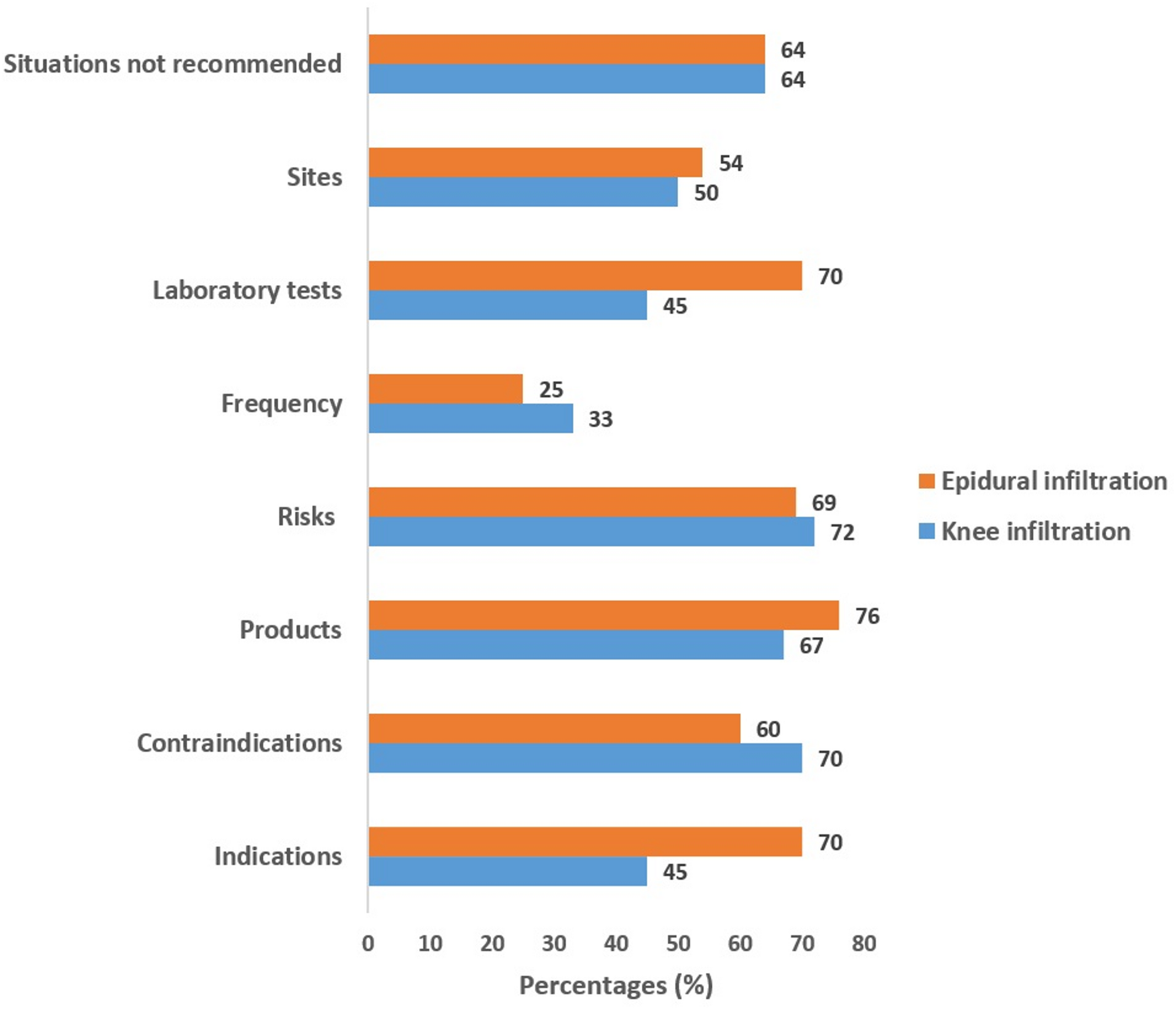Knee and epidural infiltrations are among the most common rheumatological procedures. Due to the shortage of rheumatologists in Cameroon (Sub-Saharan Africa), GPs play a vital role in treating patients with rheumatic diseases. However, before recommending this routine practice to GPs, it is necessary to assess their knowledge and practices, which was the aim of our study. There is little data available on this subject in sub-Saharan Africa, despite the recognized importance of GPs in the management of many rheumatic diseases [14]. Our study found that infiltration practices among GPs in Cameroon were performed in 23.2% of cases for the knee and 8.5% for the epidural. Knowledge and practice scores for these procedures are average and are linked to certain factors related to undergraduate and postgraduate training.
We found that GPs performed 23.2% of knee infiltrations and 8.5% of epidural infiltrations. The use of knee and epidural infiltrations by GPs varies according to geographical context. In high-income countries such as France, studies indicate that 15 to 30% of cases of knee osteoarthritis are managed with infiltrations by GPs, while epidurals predominantly remain the responsibility of specialists [15]. Key determinants include access to ultrasound guidance, which reduces failure rates for knee infiltrations, and ongoing training [15, 16]. Conversely, in sub-Saharan Africa, where rheumatologists are scarce, GPs perform these procedures more frequently despite the risks [17, 18]. This is also due to a lack of accessible therapeutic alternatives, such as surgery, competent physiotherapy, and the limited technical resources available [18]. Certain patient-related factors may also influence the use of infiltrations, notably obesity, as reported by Bello et al. [18].
We reported average scores for knowledge of knee and epidural infiltration, as well as for practice. There is a lack of literature on GPs’ knowledge of infiltration. This includes indications and absolute contraindications, such as active joint infection, anticoagulation and unbalanced diabetes, as well as the management of side effects, such as post-corticoid hypertensive flare-ups. A French study reported that only 40% of GPs were familiar with contraindications [15]. Factors influencing this poor level of knowledge and practice included gender; undergraduate rheumatology training of less than four weeks; having been in practice for less than three years; and never having attended a workshop or training course on infiltration. These data are consistent with literature. Liddell et al., in a study of 251 GPs in the United Kingdom, found that gender (male), experience (more than 10 years), specialized training (interest in rheumatology or orthopedics), and those practicing in rural areas were significant determinants of performing intra-articular injections, particularly in the knee, shoulder, and elbows [19]. In Germany, Spruit et al. found that 81% of GPs surveyed felt competent in performing musculoskeletal injections, particularly due to a lack of confidence in injection procedures, a lack of practical training, and little confidence in the diagnosis and therapeutic benefits of these procedures. They also reported a high referral rate after the procedure [20]. In a study of 204 GPs in Ireland, Farrell et al. found that 72% performed intra-articular injections, particularly in the knee and shoulder, with barriers such as their skills and medico-legal concerns [21]. Moore et al., in an interview with primary care physicians, found that barriers included a lack of confidence and discomfort with these procedures, the risk of side effects, incertitude regarding evidence and guidelines, and technical uncertainties [22].
Specialized training (e.g. workshops, echoguidance), access to contextualized recommendations, and clinical experience can significantly improve GPs’ knowledge and skills in rheumatology procedures [15, 16, 23]. Improving the training of GPs would likely reduce patient waiting times for these procedures and decrease the rate of referrals after the procedure [19]. Conversely, poor knowledge is associated with professional isolation, a lack of interaction with rheumatologists, and a scarcity of continuing training courses adapted to the local context, particularly in sub-Saharan Africa [17, 24]. It should also be noted that logistical constraints in Sub-Saharan Africa lead to non-standardized practices and higher rates of complications [18].
In order to improve the current situation in Cameroon, a number of important lessons need to be learned. With regard to training, we should advocate improving exposure to rheumatology during undergraduate internships and developing short training modules on rheumatology procedures (including punctures and infiltrations), as well as simplified protocols for GPs to use [25]. Telemedicine should be used to mentor young GPs, especially in rural areas [18]. Finally, reinforce practical teaching during undergraduate courses and encourage postgraduate training in rheumatology procedures.
Interpretation of the data from this study must take into account a number of limitations. Firstly, there is the common bias in data collection associated with online studies. Nevertheless, this is an important means of obtaining data for this type of study. Another limitation is the small sample size, as 80% of the 500 GPs trained annually in Cameroon leave the country, making them ineligible for the study. Additionally, this study focused on young GPs with no more than 5 years’ experience, due to the harmonization of undergraduate training programs in Cameroon 12 years ago, with the first cohort graduating 5 years ago. Nevertheless, this study enables us to establish the current situation and identify the key determinants on which it will be crucial to act. These data are consistent with those reported in the literature. Further studies are needed to assess teaching methods related to these procedures for undergraduate students and to evaluate the impact of workshops and courses on the current level of knowledge and practice of postgraduate GPs.
